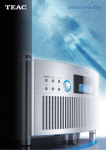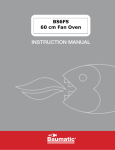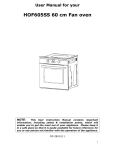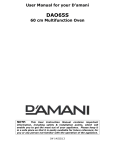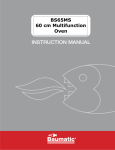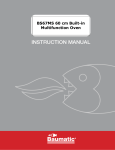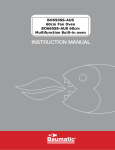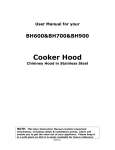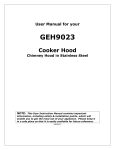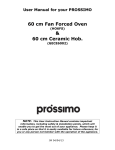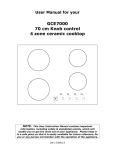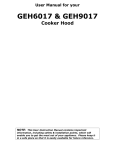Download User Manual for your
Transcript
User Manual for Your VO6FS / VO6FW 60 cm Fan oven NOTE: This User Instruction Manual contains important information, including safety & installation points, which will enable you to get the most out of your appliance. Please keep it in a safe place so that it is easily available for future reference; for you or any person not familiar with the operation of the appliance. 1 Contents Environmental note 4 Important safety information 5-7 Specifications Product and aperture dimensions Product specifications Standard accessories Electrical details Cooling fan Control panel 8-9 8 8 8 9 9 9 Setting and using the oven programmer/timer Selecting manual operation mode Setting the minute minder function 10 - 11 10 11 Selecting a cooking function and temperature Before first use Selecting an oven function Oven functions Thermostat control knob Oven operating light Cooking guidelines Warnings Shelf positions 11 - 14 11 12 12 12 12 13 14 14 Cleaning and maintenance Replacing the oven bulb Removing the oven door for cleaning 15 - 17 16 16 - 17 Installation Electrical connection Installing the oven into the kitchen cabinet Positioning the appliance Ventilation requirements 18 - 20 18 19 19 20 My appliance isn’t working correctly 21 – 22 Cooking tables 23 Contact details 23 2 3 Environmental note o The packaging materials that the manufacturer uses are environmentally friendly and can be recycled. o Please discard all packaging material with due regard for the environment. 4 IMPORTANT SAFETY INFORMATION Your safety is of the utmost importance to us. Please make sure that you read this instruction booklet before attempting to install or use the appliance. If you are unsure of any of the information contained in this booklet, please contact the Customer Care Department. General Information o This appliance is designed for domestic household use and can be built into a standard kitchen cabinet or housing unit. o IMPORTANT: The adjacent furniture or housing and all materials used in the installation must be able to withstand a minimum temperature of 85°C above the ambient temperature of the room it is located in, whilst in use. o Certain types of vinyl or laminate kitchen furniture are particularly prone to heat damage or discolouration at temperatures below the guidelines given above. o Any damage caused by the appliance being installed in contravention of this temperature limit, or by placing adjacent cabinet materials closer than 4mm to the appliance, will be the liability of the owner. o The use of this appliance for any other purpose or in any other environment without the express agreement of the manufacturer will invalidate any warranty or liability claim. o Your new appliance is guaranteed against electrical or mechanical defects, subject to certain exclusions that are noted in the manufacturer’s Conditions of Guarantee. The foregoing does not affect your statutory rights. o Repairs may only be carried out by service engineers that are approved by the manufacturer. Warning and safety instructions o This appliance complies with all current European safety legislation. The manufacturer does wish to emphasise that this compliance does not remove the fact that the appliance surfaces will become hot during use and retain heat after operation. Care should be taken to avoid touching heating elements inside the oven. 5 Child Safety o We strongly recommend that babies and young children are prevented from being near to the appliance and not allowed to touch the appliance at any time. o If it is necessary for younger family members to be in the kitchen, please ensure that they are kept under close supervision at all times. General Safety o Do not place heavy objects on the oven door or lean on the oven door when it is open, as this can cause damage to the oven door hinges. o Do not leave heated oil or fat unattended, as this is a fire risk. o Do not place pans or baking trays directly on the base of the oven cavity, or line it with aluminium foil. o Do not allow electrical fittings or cables to come into contact with areas on the appliance that get hot. o Do not use the appliance to heat the room it is located in or to dry clothing. o Do not install the appliance next to curtains or soft furnishings. o Do not attempt to lift or move cooking appliances by using the oven door or handle, as this may cause damage to the appliance or result in injury to the person lifting the appliance. Cleaning o Cleaning of the oven should be carried out on a regular basis. o Great care should be taken whilst using this appliance and when following the cleaning procedure. A steam cleaner is not to be used. o Do not use harsh abrasive cleaners or sharp metal scrapers to clean the oven door glass since they can scratch the surface, which may result in shattering of the glass o IMPORTANT: The appliance must be disconnected from the mains before following the cleaning procedure. 6 Installation This appliance must be correctly installed by a suitably qualified person, strictly in accordance with the manufacturer’s instructions. o The manufacturer declines any responsibility for injury or damage, to person or property, as a result of improper use or installation of this appliance. o Heat, steam and moisture will be created during use of the appliance, take care to avoid injury and ensure that the room is adequately ventilated. If the appliance is going to be used for prolonged periods of time, then additional ventilation may be required. o Please consult with your qualified installer if you are in any doubt about the amount of ventilation that you will require. Declaration of conformity o In the parts destined to come into contact with foodstuffs, this appliance is in accordance with the requirements of the EC directive 89/109 transposed in the Italian Legislative Decree No. 108 of 25/01/92. o CE: Appliance conforming to the European directives 89/336/EEC, 93/68/EEC, 73/23/EEC and subsequent revisions and “RoHS” directive 2002/95/CE.* o The manufacturer declares that the oven is built using certified materials and requires the appliance to be installed in accordance with the standards currently in force. This appliance must be used by a trained person for domestic purposes only. * The RoHS directive stands for “the restriction of the use of certain hazardous substances in electrical and electronic equipment”. This directive bans the placing on the EU market of new electrical and electronic equipment containing more than the agreed levels of lead, cadmium, mercury, hexavalent chromium, polybrominated biphenyl (PBB) and polybrominated diphenyl ether (PBDE) flame retardants. 7 Specifications Product Dimensions Aperture Dimensions Height: Width: Depth: 580 mm – 583 mm 560 mm 550 mm (min) 590 mm 595 mm 550 mm Product specifications o o o o o o o o 4 oven functions Energy efficiency class: A Oven capacity: 59 / 50 litres Minute minder Cooling fan Thermostatically controlled grill Double-glazed removable door Oven light Standard accessories o Safety shelf o Enamelled baking tray with handle o Trivet 8 Electrical details Rated Voltage: Supply Connection: Max Rated Inputs: Mains Supply Lead: Oven Light Bulb: 220 - 240 Vac 50/60 Hz 13 A 2.35 kW 3 x 1.5mm² 25 W/300°C screw type pygmy Cooling fan o A tangential cooling fan is fitted inside of this appliance, to make the internal temperature of the oven stable and the external surface temperature lower. o After you have finished cooking and switched off the oven, the cooling fan will continue to run for a period of time afterwards. The length of time will depend on how long the oven has been switched on for and at how high a temperature Control Panel 1) Oven function selector knob 2) Power indicator light 3) Minute minder/manual operation control knob 4) Oven operating light 5) Thermostat control knob 9 Setting and using the oven Selecting manual operation mode Before you can select a cooking function or set a temperature, you must set the appliance into manual operation mode. o Turn the manual operation control knob (3) anti-clockwise, so that it points at the word ON. Setting the minute minder function You are able to set the minute minder at any time, regardless of whether an oven function has been selected. You can set a period of time using the minute minder function and an alarm will sound when this period of time has elapsed. o The minute minder can be used independently of an oven cooking function for a time period of up to 120 minutes. o To set the timer, turn the minute minder control knob (3) clockwise to the required countdown time. o DO NOT turn the minute minder control knob (3) past the 120 minute marking. o DO NOT turn the minute minder control knob (3) anti-clockwise past the word ON. o The time period that has been set will expire when the control knob reaches zero, a brief audible signal will sound and the oven will switch off. The oven will switch off when the countdown time has expired. Before you next use the oven, you MUST turn the minute minder control knob (3) anti-clockwise, so that it points at the word ON. Otherwise the oven will not work. 10 Selecting a cooking function and temperature IMPORTANT: Make sure that you have set your oven into manual operation mode before selecting an oven function and temperature. Before first use o To remove any residue from the oven that may have been left from the manufacturing process, you should select the fan oven function and set the thermostat to its maximum temperature setting. o It is perfectly normal for a smell to be produced during this process. o You should make sure that any windows in the room are left open during this process. o It is advisable for you not to remain in the room whilst the burning off process is taking place. o You should leave the oven on maximum setting for 30 – 40 minutes. o After the oven cavity has cooled, it should then be cleaned with warm soapy water, using either a sponge or soft cloth. No abrasive cleaners should be used. o Outer parts of the oven should be cleaned with warm soapy water, using either a sponge or soft cloth. No abrasive cleaners should be used. o We would recommend that an appropriate stainless steel cleaner and polish is regularly used on the stainless steel surfaces of this appliance. 11 Selecting an oven function The oven function selector knob should be used to select the particular mode of cooking that you require. The appliance will utilise different elements within the oven cavity, depending on the oven function that you select. When a function is selected, the power indicator light will come on. Oven functions OVEN LIGHT: Separate light control which allows the light to be switched on, even when the oven is not cooking. DEFROST MODE: The fan runs without heat to reduce the defrosting time of frozen foods. The time required to defrost the food will depend on the room temperature, the quantity and type of food. Always check food packaging for the defrosting instructions. FAN OVEN: This method of cooking uses the circular element while the heat is distributed by the fan. This results in a faster and more economical cooking process. The fan oven allows food to be cooked simultaneously on different shelves, preventing the transmission of smells and tastes from one dish onto another. HALF GRILL: This method of cooking utilises the inner part only of the top element, which directs heat downwards onto the food. This function is suitable for grilling small portions of bacon, toast and meat etc…. Thermostat control knob o The oven thermostat control knob sets the required temperature of the oven. It is possible to regulate the temperature within a range of 50 250°C. o Turn the control knob clockwise. Oven operating light o This light will come on to indicate that the oven’s heating elements are in operation. The light will turn off when the temperature set on the thermostat control knob has been reached. It will cycle on and off throughout the cooking time. 12 You should not place food inside the cavity, until the correct cooking temperature has been reached. Cooking guidelines o Please refer to the information given on food packaging for guidance on cooking temperatures and times. Once familiar with the performance of your appliance, temperatures and times can be varied to suit personal preference. o If you are using the fan oven function, then you should follow the information given on the food packaging for this particular mode of cooking. o You should pre-heat the oven and not place food inside of it until the oven operating light has gone off. You can choose not to pre-heat when using the fan oven mode; however you should extend the cooking time given on the food packaging by at least ten minutes. o IMPORTANT: You should ALWAYS pre-heat the oven if you are baking. o If there is no guidance given on the food packaging specifically for cooking in fan oven mode, you can generally reduce the cooking time and temperature by 10% from the information given for conventional oven cooking. o Make sure that frozen foods are thoroughly thawed before cooking, unless the instructions on the food packaging advise that you can “cook from frozen”. o Before cooking, check that any accessories that are not required are removed from the oven. o Place cooking trays in the centre of the oven and leave gaps between the trays to allow air to circulate. o Try to open the door as little as possible to view the dishes. o The oven light will remain on during cooking. 13 Warnings o Keep the oven door closed when using ALL oven functions, including the grill function. o Do not use aluminium foil to cover the enamelled baking tray or heat items wrapped in aluminium foil under the grill. The high reflectivity of the foil could potentially damage the grill element. o You should also never line the base of your oven with aluminium foil. o During cooking, never place pans or cookware directly onto the bottom of your oven. They should always be placed on the shelf provided. o The grill heating element becomes extremely hot during operation, avoid touching it inadvertently when handling the food which you are grilling. o Important: Be careful when opening the door, to avoid contact with hot parts and steam. Shelf positions Your oven will come supplied with the following oven furniture: (A) Safety shelf (B) Enamelled baking tray o The numbers 1 – 4, indicate the different shelf positions that you can utilise within the oven. o You should use the shelf position(s) that you find are best suited to your personal cooking preferences. 14 Cleaning and maintenance Cleaning operations must only be carried out when the oven is cool. The appliance should be disconnected from your mains supply before commencing any cleaning process. o The oven should be thoroughly cleaned before it is operated for the first time and after each use. This will avoid residual food stuffs becoming baked on the oven cavity. After residues have been baked on several times, they are far more difficult to remove. o Never clean the oven surfaces by steam cleaning. o The oven cavity should only be cleaned with warm soapy water, using either a sponge or soft cloth. No abrasive cleaners should be used. o Any stains that may appear on the bottom of the oven will have originated from food splashes or spilt food, these splashes occur during the cooking process. These could possibly be a result of the food being cooked at an excessively high temperature or being placed in cookware that is too small. o You should make sure that the cooking temperature that is selected is appropriate for the food that you are cooking. You should also ensure that the food is placed in an adequately sized dish and use the enamelled baking tray where appropriate. o Outer parts of the oven should only be cleaned with warm soapy water, using either a sponge or soft cloth. No abrasive cleaners should be used. o We would recommend that an appropriate stainless steel cleaner and polish is regularly used on the stainless steel surfaces of this appliance. o If you use any form of oven cleaner on your appliance, then you must check with the manufacturer of the cleaner that it is suitable for use on your appliance. o Any damage that is caused to the appliance by a cleaning product will not be fixed by the manufacturer free of charge, even if the appliance is within the guarantee period. 15 Replacing the oven bulb IMPORTANT: The oven must be disconnected from your mains supply before you attempt to either remove or replace the oven bulb. o Remove all oven shelves, the drip tray and the side rack that is on the same side as the oven light. o Remove the light cover by turning it anti-clockwise. o Unscrew the bulb clockwise and remove it from its holder. o Replace the bulb with a 25 W/300°C, screw type pygmy. o Do not use any other type of bulb. o Place the lamp cover back into position. Removing the oven door for cleaning To facilitate the cleaning of the inside of the oven and the outer frame of the oven, the door can be removed as follows:o The hinges (A) have two movable bolts on them (B). o If you raise both of the movable bolts (B), then the hinges (A) are released from the oven housing. o You should grip the sides of the door at the centre and then incline it slightly towards the oven cavity and then pull the door gently away from the oven cavity. o IMPORTANT: You should make sure that the door is supported at all times and that you place the door on some padded material whilst cleaning it. 16 o The oven door and door glass should only be cleaned using a damp cloth and a small amount of detergent. The cloth MUST NOT have come into contact with any form of cleaning product or chemical previously. o To refit the door you should slide the hinges back into their slots and open the door fully. o IMPORTANT: The movable bolts (B) must be closed back into their original positions before closing the door. o Take care not to dislodge the hinge locking system when removing the door, as the hinge mechanism has a strong spring. o Do not immerse the door in water at any time. 17 INSTALLATION The installation must be carried out by a suitably qualified person, in accordance with the current version of the following. o AS/NZS 3000:2007 Wiring Regulations o 2010 Electricity Safety Regulations Electrical connection Before connecting the appliance, make sure that the supply voltage marked on the rating plate corresponds with your mains supply voltage. WARNING: THIS APPLIANCE MUST BE EARTHED. o This appliance is provided with a 13A 3-pin plug for use with a suitable 15A GPO placed in an easily accessible position adjacent to the appliance. The outlet must still be accessible even when your oven is located in its housing. o To connect the oven power cord, loosen and remove the cover on the terminal block, in order to gain access to the contacts inside. Make the connection, securing the cord in place with the cable clamp provided and then immediately close the terminal block cover again. o If you have to change the oven power cord, the earthing (yellow/green) conductor must always be 10 mm longer than the line conductors. o Care must be taken to ensure that the temperature of the mains supply cable does not exceed 50°C. o If the mains supply cable is damaged, then it must be replaced by an appropriate replacement which can be obtained from the Spares Department. 18 Installing the oven into the kitchen cabinet Positioning the appliance o Ensure that the aperture that you will be fitting the oven into is of the size given in the above diagram. o The oven must be fitted into an oven housing with the ventilation cut-outs shown in the “Ventilation requirements” section on the next page. o Ensure that the rear panel of the furniture housing unit has been removed. 19 Ventilation requirements (Figure shows the ventilation and cut-out requirements for the installation of the appliance into a standard kitchen unit). (Figure shows the ventilation and cut-out requirements for the installation of the appliance into a tall housing unit). o Ensure that the oven has been securely fixed into the housing unit. The fixing of the oven into the housing is made by using four screws. These should be screwed through the oven cabinet and into the housing unit. 20 My appliance isn’t working correctly o The oven isn’t coming on. * Check that you have selected a cooking function and a cooking temperature. o There appears to be no power to the oven and grill. * Check that the appliance has been connected to the electrical mains supply correctly. * Check that the mains fuses are in working order. * Check that the operating instructions for putting the appliance into manual operation mode have been followed. o The grill function works but the main oven does not. * Check that you have selected the correct cooking function. o The grill and top oven element is not working, or cuts out for long periods of time during use. * Allow the oven to cool for approximately 2 hours. Once cool, check whether the appliance is again working properly. o My food is not cooking properly * Ensure that you are selecting the correct temperature and the correct cooking function for the food that you are cooking. It may be appropriate to adjust your cooking temperature by plus or minus 10°C, to achieve the best cooking results. o My food is not cooking evenly * Check that the oven has been installed correctly and is level. * Check that the correct temperatures and shelf positions are being used. o The oven light is not working * Refer to pages 15 and follow the “Replacing the oven bulb” section. o I am getting condensation in my oven * Steam and condensation is a natural by product of cooking any food with high water content, such as frozen food, chicken etc. 21 * You may get condensation in the oven cavity and forming between the oven door glasses. This is not necessarily a sign that the oven is not working correctly. * Do not leave food in the oven to cool after it has been cooked and the oven has been switched off. * Use a covered container, where practical, when cooking to reduce the amount of condensation that forms. IMPORTANT: If your appliance appears not to be operating correctly, then you should disconnect it from your mains supply and then contact the Think Appliances Customer Care on telephone number 1 800 444 357. DO NOT ATTEMPT TO REPAIR THE APPLIANCE YOURSELF. Please note that if an engineer is asked to attend whilst the product is under guarantee and finds that the problem is not the result of an appliance fault, then you may be liable for the cost of the call out charge. The appliance must be accessible for the engineer to perform any necessary repair. If your appliance is installed in such a way that an engineer is concerned that damage will be caused to the appliance or your kitchen, then he will not complete a repair. This includes situations where appliances have been tiled in, sealed in with sealant, have wooden obstructions placed in front of the appliance, like plinths. Or any installation other than the one specified by the manufacturer has been completed. Please refer to the conditions of guarantee that appear on the warranty card that you receive with the appliance. IMPORTANT: The manufacturer operates a policy of continuous improvement and reserves the right to adjust and modify its products without prior notification. 22 Cooking table Fan oven Food type Weight Pre-heat time Shelf level Temperature Cooking time Beef 1kg 15 minutes 2 200° 40-50 minutes Pork 1 kg 15 minutes 2 200° 70-80 minutes Chicken 1.2 kg 15 minutes 2 200° 50-60 minutes Duck 1.5 kg 15 minutes 2 200° 50-60 minutes Steak 0.8 kg 15 minutes 2 180° 20-30 minutes Bread 0.5 kg 15 minutes 2 200° 35-45 minutes If you have any further questions please contact Think Appliances Pty Ltd: SERVICE DEPARTMENT Phone:1800 444 357 Fax:1300 133 279 Email: [email protected] SALES DEPARTMENT Phone:1300 132 824 Fax:1300 660 188 Web: www.thinkappliances.com For future reference please record the following information which can be found on the rating plate and the date of purchase which can be found on your sales invoice. The rating plate for your oven can be located by opening the oven door and looking around the outer edge of the oven chassis. Model Number ………………………………. Serial Number ………………………………. Date of Purchase ………………………………. 23























